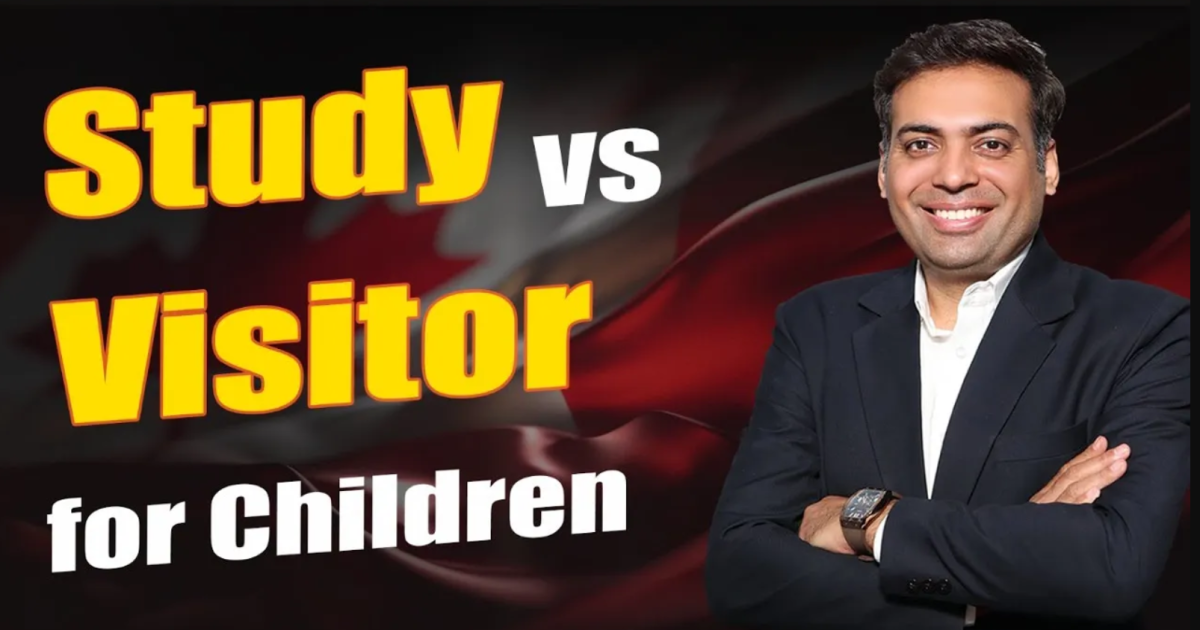Table of Contents
ToggleVisitor Visa vs Study Visa – Which is Right for Your Dependent Children?

Choosing the right visa type for your dependent children is a critical decision for any parent planning to study or work abroad. Whether you’re applying for a Study Visa, Work Permit, or Permanent Residency, understanding the difference between a Visitor Visa and a Study Visa for your children can help you make an informed and strategic choice.
At Globexa Immigration, we guide families through the most suitable pathways to reunite and settle abroad smoothly. In this blog, we’ll explain the key differences, pros and cons, and when to choose a Visitor Visa vs. a Study Visa for your dependent children.
1. What is a Visitor Visa for Children?
A Visitor Visa (or Temporary Resident Visa – TRV) allows your dependent child to accompany you and stay in the country as a visitor. This visa is usually valid for 6 months to 10 years, depending on the country, and does not allow formal education in public institutions without further authorization.
✅ Ideal for:
Children below school-going age (e.g., under 5 or 6 years)
Short-term stays
Children who do not plan to attend school immediately
Parents who want to delay tuition fees
2. What is a Study Visa for Children?
A Study Visa or Study Permit allows your child to legally enroll in a public or private school in countries like Canada, Australia, or UK. It is issued for the duration of the academic program and comes with benefits like access to government-funded education.
✅ Ideal for:
School-going children (generally above 5-6 years old)
Long-term stays
Children who plan to attend school full-time
Parents with long-term immigration or study goals
3. Key Differences at a Glance
A Visitor Visa is primarily intended for short-term stays such as tourism or family visits, and it does not allow children to attend school without applying for additional authorization. In contrast, a Study Visa is specifically designed for children who intend to pursue full-time education, whether in public or private schools. When it comes to validity, Visitor Visas usually range from six months to up to ten years (depending on the issuing country), while Study Visas are valid for the full duration of the academic program.
Processing times also differ—Visitor Visas are generally quicker to process, whereas Study Visas may take longer due to the need for more documentation such as school admission letters and proof of financial support. In terms of cost, Visitor Visas are more economical, while Study Visas often come with higher expenses, including tuition fees and additional requirements. Neither visa type permits the child to work, but access to healthcare is another distinguishing factor; children on Study Visas may be eligible for public healthcare in some countries, while those on Visitor Visas typically require private insurance.
4. Factors to Consider When Choosing the Right Visa
🧒 Age of Your Child
Under 5: Visitor Visa may be sufficient.
Above 5: Study Visa is recommended if education is planned.
🕰️ Duration of Stay
Short stay (<6 months): Visitor Visa is more practical.
Long-term stay (1+ year): Study Visa is ideal.
🏫 Education Goals
If your child will attend school, a Study Visa is mandatory in most countries.
💰 Financial Preparedness
Study Visas involve tuition fees and living expenses proof.
Visitor Visas are less expensive initially.
5. Country-Specific Notes
Canada:
Children accompanying parents on Study or Work Permits may qualify for free public schooling.
A study permit is mandatory for school-aged children (generally 5+).
Australia:
Dependents must apply for a Student Dependent Visa, and school-age children may have to pay international tuition fees.
United Kingdom:
Children of students may require a Child Student Visa if they’re under 18 and plan to study.
6. Common Mistakes to Avoid
❌ Applying for a Visitor Visa when your child is already of school age
❌ Not submitting the correct documents (e.g., birth certificate, guardianship letters)
❌ Assuming that children of international students get automatic schooling rights
❌ Failing to check healthcare eligibility under the visa category
7. Final Advice: Which is Right for Your Child?
If your child is not of school age and will stay temporarily, a Visitor Visa is fine.
If your child is school-aged and plans to stay longer, a Study Visa is usually mandatory and more beneficial in the long run.
8. Need Expert Help? Contact Globexa Immigration Today!
At Globexa Immigration, we specialize in Family Visa Applications, including Study Visas for Children, Visitor Visas, Spouse Open Work Permits, and more. Whether you’re applying from India or abroad, our experienced counselors ensure every child’s application meets visa compliance and educational needs.
📞 Book a Free Consultation
🌐 www.globexaimmigration.com
📍 Best Visa Consultant in Haryana | Trusted Immigration Agent in Panipat
9. Frequently Asked Questions (FAQs)
❓Can I send my child on a Visitor Visa and then convert to a Study Visa later?
Yes, in most countries, you can apply for a study permit from within the country, but it’s not always guaranteed. It’s better to plan ahead.
❓Is education free for children of international students?
In countries like Canada, yes – but only if you hold a valid Study or Work Permit and the child has a proper Study Visa.
❓Is there an age limit for children to apply for a Study Visa?
No fixed limit, but most countries require a Study Visa starting from kindergarten age or above (usually 5+).

